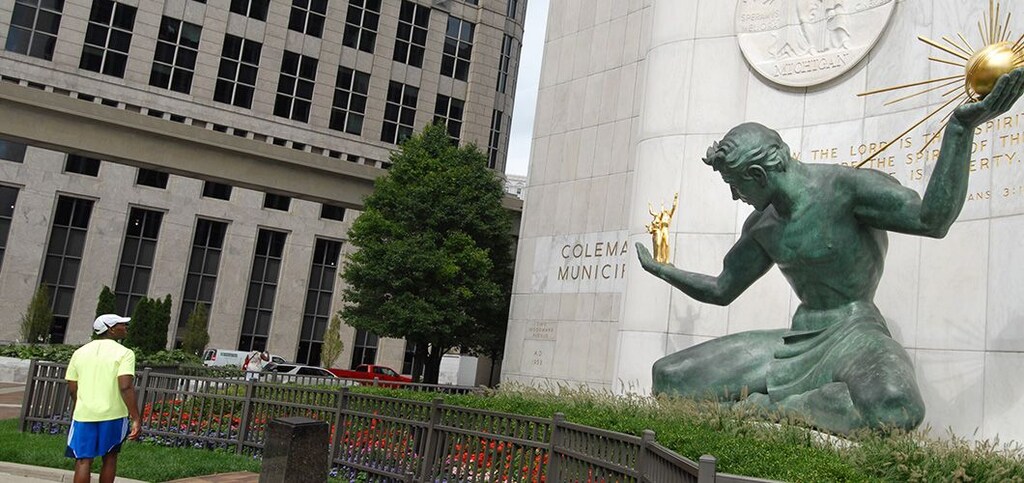Detroit made history in July when it became the largest city to file for bankruptcy. But you never would have known it sitting inside a 30,000-square-foot building in the heart of the city’s Corktown neighborhood on September 16.
At 6 p.m., more than 100 people flooded into a building dubbed Ponyride, located at the corner of Vermont Street and Porter Street, to listen to presentations from three social entrepreneurs looking to start ventures that would help the community. Host and local nonprofit Detroit SOUP served a three-course meal to participants for $5 each. At the end of the dinner, attendees voted on the business idea they liked best and the winner was gifted the proceeds from the dinner.
Four hours and three presentations later, Shaka Senghor, an ex-convict turned author and entrepreneur, was called to the front of the room and accepted the winning check as the crowd broke into thunderous applause. Senghor plans to use his winnings to launch an online component of The Atonement Project, a nonprofit that helps victims of violent crimes and aids convicts in expressing their feelings through art projects, theater presentations and workshops.
A native of Detroit, Senghor says the city has long had a thriving entrepreneurial spirit. “We are a hustler city; that isn’t anything new,” he says. “This is a great place to start a company.”
Surge Of Support
The recent surge of community support for new ventures is making Motown more attractive to businesses and social ventures.
Detroit attracted several national events in September alone, including Techonomy, a conference that brought together tech stars such as Jack Dorsey of Square and Chad Dickerson of Etsy to discuss ways to boost the U.S. economy through innovation, and OpenCo, which facilitated networking and idea sharing between founders and tech thought leaders.
Yet the event that took place in Ponyride is a perfect example of the neighbors helping neighbors ethos taking over Detroit.
“I founded Slows [Bar BQ] in 2005 and in less than three years, we’d paid off all of our loans," says local restaurateur Phillip Cooley, who opened Ponyride two years ago. "So I hired a general manager and shifted my focus on building up the community." He purchased the building, a foreclosure, for $100,000 and invited budding businesses to move in for low rent in exchange for offering community outreach programs.
Today Ponyride is home to more than 30 businesses ranging from a dance studio to a boat maker. “We offer a 75 percent rent subsidy and have a waiting list of companies that want to reside here,” Cooley says. “We should have 50 by the end of the year and are considering opening a second Ponyride location.”
Over in Ferndale, a community just north of downtown Detroit, Scott Moloney is enjoying success largely thanks to the local community. The founder of Treat Dreams, a gourmet ice cream shop and food truck that launched in 2010, Moloney says he has been blown away by business-to-business support all over Detroit.
“Dan Gilbert [founder of Quicken Loans and architect of much of Detroit’s downtown revitalization] launched this summer food program where he set up a semi-permanent structure and invited food vendors to come over,” says Moloney, who sat on a panel with Dorsey at Techonomy. “I parked my food truck there for five weeks and received tremendous exposure from that.”
While one might suspect there would be fierce competition among local ventures, that just isn't the Detroit way, Moloney says. And instead of appealing to government or banking institutions for grants and loans, people are helping one another. "We all realize that a rising tide lifts all boats," he explains. "Companies are hosting other companies in pop-ups and shared spaces. Businesses are stepping in to fill the void and we are all benefiting.”
Detroit has been in a funk for at least “a dozen years,” Moloney continues. “We’ve realized that the cavalry isn’t coming in. No one cares about saving business so we are having to save them ourselves.”
Collaboration and community involvement changed everything for Anthony Montalbano and Brian Ritter, co-founders of AMBR Detroit, a mobile development company that presented at OpenCo. The pair left jobs at an Ann Arbor-based company in late 2011 to launch a mobile app and applied to BizDom, a Detroit-based startup incubator. Their pitch failed, but the experience presented them with an even better opportunity. “Even though we didn’t get picked, BizDom asked us if we wanted to consult for them and help the startups that did get picked with mobile development,” says Ritter. “It was our aha moment, to market for developers.”
Now AMBR Detroit is incredibly busy. The lack of competition among local companies is easy for Montalbano to understand. “Everyone wants Detroit to succeed,” he says. “It isn’t just about individual businesses. There is an overall positive feeling for everyone to help each other out to reach the higher goal of Detroit being a success.”
Model City
Detroit’s revival is a culmination of organic efforts and can provide lessons for other cities looking to follow suit.
As an example, four years ago when Montalbano helped organize a tech-related Meetup in Detroit, a group of 10 people would sit and chat at a coffee shop. Today more than 600 people come to the same meeting.
“I really recommend people in other cities to join or organize group events," he says. "You can do that anywhere. Take our story and learn from us.”
Even in the face of devastating bankruptcy, Detroiters are steadfast in their belief that a better future is right around the corner. “The ideas coming out of this city are just getting better and better,” Montalbano says. “Pretty soon some of those ideas are going to hit it out of the park and really put Detroit on the map.”
Read more articles on Detroit.
Photos: Getty Images, Courtesy Shaka Senghor, Courtesy Phillip Cooley, Courtesy Scott Moloney, Courtesy Anthony Montalbano and Brian Ritter




